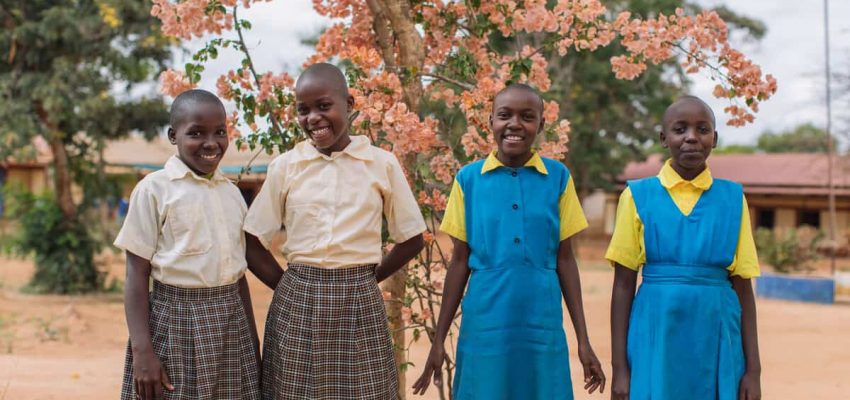In East Africa, rain has not fallen for nearly four rainy seasons. The 2022 rainy season was the driest it’s been in the last 70 years. Failing farms, depleted livestock, and skyrocketing food prices due to the war on Ukraine has led to an unprecedented food crisis and is threatening East Africa with famine.
Stories from the frontlines: Kenya
Makueni County in Nairobi, Kenya has not experienced rainfall in two years. The drought has affected communities so much that families are surviving on just one meal a day and students are missing school because there is not enough food.
The drought has a disproportionate impact on women and girls. Girls are forced to drop out of school and become caretakers of younger family members as parents search farther and farther from home for food. Child marriages are also increasing as parents marry daughters off because they can no longer afford to provide their basic needs. Even more, violence, including gender-based violence, is on the rise as people struggle to cope with the impacts of the drought.
At a primary school in Makueni County, ActionAid supports a School Feeding Program that gives children access to a lunch of maize and beans. The meals are helping children stay in school and ensuring they have at least one good meal a day.
Headteacher Domitila outside her office at a primary school in Makueni County. Photo: Sarah Waiswa/ActionAid.
Domitila, the headteacher at the school, shared with us how the feeding program has positively impacted students and their families:
“Due to the crisis…prices of food items have gone so high. That means we have had to reduce the amount of food that can be cooked at home. There is not enough food…which makes pupils absent from school due to their stomachs being empty.
Because of the drought, we sat down as a school community and agreed with the parents to start feeding the very young ones in the Early Child Development (ECD) class with porridge. From ActionAid…we managed to get food for our school feeding program. We are doing well with it. Parents have also joined in by providing water, salt, and the cook to cook for our pupils. The lunch is helping our pupils. Teaching in the afternoons, you find that our pupils are alert, and they are participating well due to that lunch. ActionAid has helped us to continue well.”
Catherine, the Local Rights Programme Coordinator for ActionAid in Kenya, helped to organize and manage the delivery of the food packages to the school. She shared with us:
“In [Makueni County], the community has been seriously devastated by the effects of drought. Most families are living without food. They are living on one meal, instead of three meals which they used to live on.
If these children don’t eat anything at home, they are sure that when they come to school they will eat lunch, which is composed of maize, beans and oil.
Catherine, ActionAid’s LRP Coordinator, standing outside of the ActionAid office in Kathonzweni, Makueni County. Photo: Sarah Waiswa/ActionAid
This stays longer in the stomach than porridge, which once you eat, disappears so fast from the body, and you become hungry so soon.
Many girls are (also) not going to school because their parents do not have money to buy sanitary pads for them. Girls are being left with children as parents go to look for resources.
This is a collective responsibility for all of us to fight this drought.”
The feeding program is vital to ensuring that children can stay in school. Jane, a mother who has three children attending the primary school, told us that the drought has reduced the number of meals the family can afford and increased the threat of domestic violence at home. She shared that she is joining other parents at the school to support the feeding program to ensure that it can continue.
Jane, 55, has three of her children attending the primary school. Photo: Sarah Waiswa/ActionAid.
“At my age of 55 years, I have not seen a drought like the one we are experiencing. The food prices are increasing, and our income is very low from our casual work. As the parents of this school, we have agreed as the community to support our pre-primary children by providing porridge, because at home we only have one meal a day now. Our husbands have no jobs and when we tell them about the lack of food, sometimes they beat us.”
Minoo is a pupil at the primary school where ActionAid is supporting a feeding program in Makueni County, Kenya. Photo: Sarah Waiswa/ActionAid.
Minoo is an eighth grade student at the primary school. Her parents are able to send her to school and provide a meal at home, but this is not enough as soaring food prices are affecting the amount of food they can provide. She shared with us:
“Drought has affected us before but as of now we have nothing in our shambas (farms). My parents are doing hard work to get money for food and provide what I need for school, but the food prices are very high so our parents can’t afford much.
In school we learnt about drought and ways of addressing it, like through water conservation and tree planting for a better environment.
As of now I have eaten through the ActionAid feeding program. I was hungry and am going to tell my fellow pupils who are at home that we are being provided with food so that they can come back to school and continue their studies.”
Benedetta is a cook at the primary school and a mother of three children. She shared with us that the drought has lasted at least two years and has caused a lot of challenges for the community. Food is scarce and even adults are struggling with the impact of the crisis.
Benedetta, a cook, prepares lunch for pupils at the primary school in Makueni county Kenya. Photo: Sarah Waiswa/ActionAid.
“Sometimes some pupils do not come to school due to lack of food at home, or lack of school fees. As a cook this is a challenge because I am cooking for them. During lunchtime, when I serve the children, some come back for more food , as they are not sure when the next meal at home will be.
Personally I am also affected by (the food crisis), so I don’t have extra to give them. At home, I am facing challenges because I don’t have enough food for my family. The prices are too high now. When I go to school, sometimes I feel weak especially when I have not eaten the previous night. Please help.“
ActionAid has supported approximately 93,330 people in Kenya to date. This has included providing cash transfers, rehabilitating water sources, providing food to the most vulnerable families, and running school feeding programs. Local women, young people, and partner organizations on the ground are leading our response, but they need urgent support to expand their life-saving activities and avert a
catastrophe.
Source: https://www.actionaidusa.org/work/east-africa-food-crisis-feeding-students-in-kenya/









